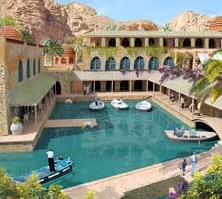From leaps in the bronze age to massive droughts that wiped out cities, civilizations we learn from history, depend on water. We need to protect our life sustaining resources now. An Akkad sculpture from Iraq.
Over the course of history, numerous civilizations have peaked and then gradually fettered out or even disappeared abruptly. In many cases, the cause of both their rise and disintegration was the same: Water. This precious resource has been a driving factor of progress in the past and will prove to be a determining factor for development in the future as well.
The Indus Valley Civilization (IVC), located in present-day Pakistan and India, was based around the Indus River and its tributaries as early as 2,600 BCE. Its efficient management of water resources has led archeologists to consider it an extremely advanced civilization for its time: The Bronze Age.
The Harappans — named after the first IVC site discovered — constructed public baths, drinking water infrastructure, water storage facilities and intricate sewage network systems. But did water also play a hand in its demise?
Till date archeologists debate over the ultimate cause for the collapse of IVC, but most of the possible theories involve water. The existence of defensive walls and multiple layers of silt found among the ruins have suggested that the civilization was destroyed by floods; an opposing theory suggests that rivers could have changed their course and caused drought and desertification. Either way, the Harappans found themselves at the mercy of water.
The Akkad civilization in Iraq, dating back to the 3rd millennium BCE and considered the predecessor of the Sumerian, Assyrian and Babylonian civilizations, thrived along the banks of the Tigris and the Euphrates.
These rivers gave rise to a massive agricultural system, resulting in one of the highest recorded population densities of the time. Southern Iraq was extremely fertile and had a yield of 30 grains returned for one grain sewn, which is more productive than present day yields aided by modern farming technology.
However, the blossoming of this civilization was short-lived due to a massive drought. The rivers experienced a sudden drop in water levels, while improper farming methods led to a progressive salinization of the soil. Trade seems to have collapsed, cattle starved and ultimately there was forced migration. Another affluent civilization had fallen prey to the devastating effects of the very water that once supported its lavish existence.
Archeologists posit that the same climatic changes that affected Akkad were in fact responsible for a dramatic change in the hydrology of the entire Middle East region and paralleled the collapse of the Old Kingdom in Egypt (2700-2200 BCE). The fertility of the Nile River is well known and hardly requires mentioning here. This river helped sustain Egyptian civilization for 3 millennia. However, a devastating drought crushed Ancient Egypt and sent it spiraling into a dark age which lasted for over 1,000 years before it was able to thrive once again. The drought and the terrible famine that followed were documented by the Egyptians themselves (in the Intermediate Period) and were later verified through scientific evidence in 2003.
According to author Jared Diamond, the importance of environmental conditions has often been understated in the narration of human history. His book ‘Guns, Germs and Steel,’ highlights the pivotal role that the environment played in the progress of societies.
Countries like Iran and the Americas were able to flourish thanks to adequate precipitation and hydrology conducive to agriculture, while Australia and certain other pacific islands were not able to progress due to harsh environmental conditions.
In the future, water will again play an important role in the same countries that housed these great civilizations. Rising water demand in India, especially within its agricultural sector, is set to almost double existing water supply by 2030.
Regional disparities of water distribution between Pakistan’s Sindh and Punjab provinces could instigate serious internal tensions in the future. Despite having abundant water supplies of around 67 BCM annually, or roughly 2,000 cubic meters per capita per year (a comfortable amount by international standards), Iraq will suffer from severe water shortage in 2020 due to the effects of water pollution, drought, poor water management, obstruction from upper riparians and as a long-term consequence of conflict.
Lastly, Egypt is undergoing a water crisis of its own.
It no longer enjoys a monopoly over the benefits of the Nile River; as supplies dwindle while demand rapidly increases Egypt must map out an effective river basin management plan that will meet its water needs while simultaneously benefitting the other 4 riparians of the river.
Water security has always been an essential element while assessing the development of a civilization. With the use of modern irrigation technology and infrastructure, the importance of water has been largely down-played in recent history.
But dwindling supplies, potential effects of climate change and a rising population have again brought water to the forefront of future development and risk analysis. It will be a key factor in the future, determining power-sharing strategies and political alliances. Just like the need for energy and the lack thereof has resulted in organizations such as Organization for Petroleum Exporting Countries (OPEC) and Shanghai Cooperation Organization (SCO), fresh, marginal and virtual water exporters will form the organizations of tomorrow.
Similarly countries that do not have adequate water resources will find themselves in a terribly disadvantageous position in the political spectrum – they risk instability, not just at an international level but also domestically.
In the past, several civilizations, recognizing the importance of water, viewed it as sacred. Water enjoyed a sacred presence in the Indus Valley, Mesopotamian and Egyptian Civilizations, taking a central role in rights and rituals.
The climatologists, environmentalists and strategists of today are once again emphasizing the importance of water for a safer and more secure future. Whether the driving force to recognize the importance of water is religious or scientific, it is time that the human race makes efforts to manage water effectively and preserve this precious resource for our future generations.
Gitanjali Bakshi is a research analyst for a political think tank in Bombay, India called Strategic Foresight Group (SFG). She specializes in strategic, political and security issues in the Middle East – with a focus in Conflict Prevention & Conflict Resolution. She was the principle researcher for ‘Cost of Conflict Middle East‘, a report by SFG that measured the economic, military, socio-political and environmental costs of various conflicts in the region over the years. She has written several articles on security in the Middle East, and has a particular area of interest in the Israel-Palestine conflict.





I knew that water played an important role in our lives, but did not know it this important. We humans could not survive without water. In fact, nothing would survive without water. Water is an essential.